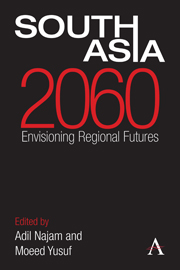Book contents
- Frontmatter
- Contents
- Acknowledgments
- List of Abbreviations
- Introduction: Imagining South Asian Futures
- Section I South Asia as a Region
- Section II State Relations
- Section III Development
- Section IV Human Well-Being
- Chapter 27 Population Dynamics, Economic Prospects and Regional Coherence
- Chapter 28 Towards Cooperation for Poverty Reduction?
- Chapter 29 Health Challenges
- Chapter 30 Regional Disease Dynamics
- Chapter 31 Education: Time Bomb or Silver Bullet?
- Chapter 32 Scholarship in and on South Asia
- Chapter 33 Rights and Justice: A Prospective View
- Chapter 34 Patriarchy, Power and Paradox: Dreaming Gender Equality and Development
- Chapter 35 Women in South Asia
- Chapter 36 Media: New Trends, Old Problems
- Chapter 37 Sports: Passion and Industry
- About the Authors
- Bibliography
- Index
Chapter 29 - Health Challenges
from Section IV - Human Well-Being
Published online by Cambridge University Press: 05 September 2013
- Frontmatter
- Contents
- Acknowledgments
- List of Abbreviations
- Introduction: Imagining South Asian Futures
- Section I South Asia as a Region
- Section II State Relations
- Section III Development
- Section IV Human Well-Being
- Chapter 27 Population Dynamics, Economic Prospects and Regional Coherence
- Chapter 28 Towards Cooperation for Poverty Reduction?
- Chapter 29 Health Challenges
- Chapter 30 Regional Disease Dynamics
- Chapter 31 Education: Time Bomb or Silver Bullet?
- Chapter 32 Scholarship in and on South Asia
- Chapter 33 Rights and Justice: A Prospective View
- Chapter 34 Patriarchy, Power and Paradox: Dreaming Gender Equality and Development
- Chapter 35 Women in South Asia
- Chapter 36 Media: New Trends, Old Problems
- Chapter 37 Sports: Passion and Industry
- About the Authors
- Bibliography
- Index
Summary
Introduction
Health disparities in South Asia are legendary, made even more apparent by the huge number of people in the region. The combined population of India, the giant of the region, Pakistan, Bangladesh, Sri Lanka, the Maldives, Afghanistan, Nepal and Bhutan is in excess of 2.25 billion, a third or more of whom toil at the very bottom of the economic ladder, earning no more than $1–2 per capita per day. While survival is possible, as the numbers demonstrate, development, a process of continuous improvement, is not. So many people living in abject poverty, suffering from ailments the wealthy are no longer exposed to, and having limited access to healthcare and preventive services, is a societal time bomb. It is the substrate for social disintegration and class struggle, for when the disparities are so great between the poor and the rich and life aspirations are so limited, those with nothing to lose may choose desperate ways to break out of the trap. Such struggles are commonplace in many poor developing countries, and are increasingly amplified by poor governance, corrupt leadership and extreme political views. This chapter will explore issues central to ensuring, by 2060, more equitable and optimal health for the people of the South Asian nations.
Health and Development
Health is now widely recognized to be an essential precondition for development. The evidence for this is well documented in the report of the Commission on Macroeconomics and Health (World Health Organization 2001), and it makes sense: healthy children learn better and healthier, better-educated adults are more productive and can generate greater individual and societal wealth.
- Type
- Chapter
- Information
- South Asia 2060Envisioning Regional Futures, pp. 229 - 237Publisher: Anthem PressPrint publication year: 2013



